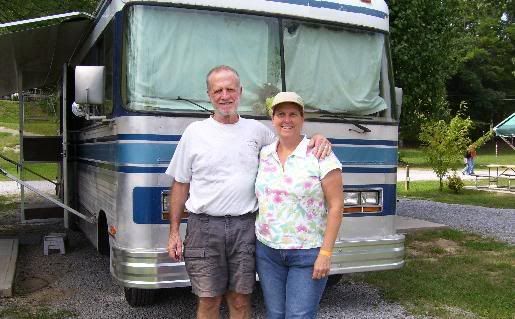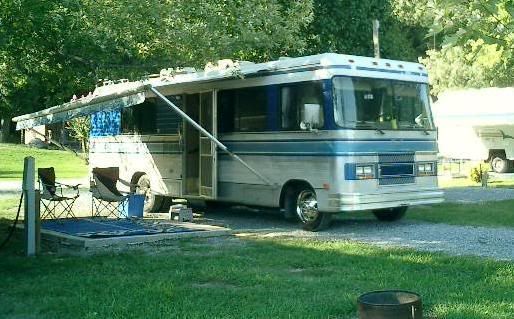Go to...  | Start A New Topic  | Search  | Notify  | Tools  | Reply To This Topic  |  |
 4/08 4/08"5+ Years of Active Membership" |
I have a 1992 Barth Regency with 8.3 liter Cummins diesel. I live in Western Massachusetts and will be leaving in late January for Florida. I have no block heater and am concerned that it will not start. Should I install a block heater? Cunning price was 300$-400 for the job. I would rather save that money to use on my trip. Is a block heater needed? Are there functional alternatives? I need some advice. BillG Bill & Georgene Goodwin 92 (Feb.) Regency 36ft 300hp Cummins Gillig Chassis (1990 build date) 2014 Honda CRV toad 10Kw Power Tech Gen w/ Kubota diesel engine Can accomodate Barth visitor with advance notice  | ||
|
Official Barth Junkie |
A block heater is the gold standard. This is a case of what you can do vs what you should do… It is always ideal to preheat the engine. Remember that the diesel uses compression heat to ignite. There are 3 factors that affect starting/compression greatly: ambient temperature, cranking speed and fuel volatility. Warming the engine preheats the air in the cylinders, warms the oil for faster cranking and helps evaporate and ignite the fuel. In addition, the warmer oil reduces cylinder wear better than cold and loose during first few minutes of running. Meanwhile, other tricks can be done independently. To improve ignition volatility, starting fluid (diethyl ether) can be sprayed in the intake. (Do not overdo or the excess can wash down the oil on the cylinder walls.) Lead acid batteries are chemical devices. Like all chemical reactions, they are sensitive to temperature. A battery produces about half as many amperes at 0 F than at 70 F. Be sure the batteries are warm and fully charged, better yet bring them inside for the night before starting. They will crank twice as fast when warm. So, with good batteries and ether it will probably start down to 0 or so, but not good for it without preheat. Best to preheat both engine and batteries, a light shot of ether and it will fire right up. 9708-M0037-37MM-01 "98" Monarch 37 Spartan MM, 6 spd Allison Cummins 8.3 325+ hp | |||
|
 8/19 8/19 |
My advice is DO NOT use ether or quick starting fluid. I would get the block heater. I live in Ohio and just use the block heater to make starting easier. Another alternative I have used is a rag dampened with gasoline held near the air intake so the engine can smell the gas fumes. I do not have any Cummings engines so I do not know the reaction for Cummings. I have used the gasoline fume trick for many years on other diesel engines instead of ether. | |||
|
 6/12 6/12Formally known as "Humbojb" 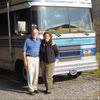 |
If it were me, I would put it in the living room just next to my favorite lounger
| ||||||||||||
|
Captain Doom |
Get the block heater; starting fluid is a last-ditch measure. Nothing good comes from cranking a cold engine in cold weather. BTW, once the engine is running smoothly and the air is pumped up, GO - get it warmed up under load. Rusty '94 28' Breakaway: MilSpec AMG 6.5L TD 230HP Nelson and Chester, not-spoiled Golden Retrievers Sometimes I think we're alone in the universe, and sometimes I think we're not. In either case the idea is quite staggering. - Arthur C. Clarke It was a woman who drove me to drink, and I've been searching thirty years to find her and thank her - W. C. Fields | |||
|
 8/19 8/19 |
We gave you your options. You can now make the educated decision based on the input here. You can smell like gas while holding the gas fumed rag. Carry your heavy batteries in the house. Freeze your fingers off wild hooking the batteries back up. Then pray it starts. OR Go outside for a few minutes to plug in the heater. Stay inside and wait about an hour. Start your coach, then unplug the heater and drive away. | |||
|
 4/08 4/08"5+ Years of Active Membership" |
Thanks all for the great advice. I'm pretty sure the block heaters going to be my choice. I need to get the coach over to Cummins so they can look at the project they wouldn't give me a price for installation until they saw the coach, only a guess. I've always appreciated the quality of advice received in this forum. Thanks again BillG Bill & Georgene Goodwin 92 (Feb.) Regency 36ft 300hp Cummins Gillig Chassis (1990 build date) 2014 Honda CRV toad 10Kw Power Tech Gen w/ Kubota diesel engine Can accomodate Barth visitor with advance notice  | |||
|
"Host" of Barthmobile.com 1/19 1/19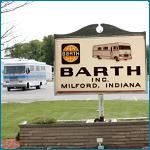 |
Fuel quality will be your biggest concern past this. Fill it up with Winter Fuel and make sure you've got additives in it before you fuel up. You want the additives mixed in and then the coach driven to get all the treated fuel throughout the system. Drain your fuel water separator and the bottom of your fuel tanks as these are two of the places that water settles. Any place that your fuel lines "dip low" will also be a collection point for moisture. While you may be able to start it, you'll still run into other weather related issues. A frozen air system will probably be the next biggest concern. Make sure your air dryer has been serviced and the "desiccant cartridge" has been replaced within the last few years. Like fuel lines, the lowest point in an airline that droops will also be a collection point for a freeze up. The air compressor discharge line and the air dryer to D-2 governor line are both very susceptible to that kind of freeze-up. I give a simple speech after freeing up a frozen system whether air or fuel... It boils down to water freezing at anything colder than 32°. I am unable to change that simple fundamental law of nature. I will get you going but if your system is heavily moisture laden you could freeze up again. That type of freezing isn't gelled summer diesel fuel. Adding fuel or air system additives will simply not melt ice, it will however encapsulate and/or dissipate the actual liquid. Getting it back to its pre-solid liquid state is the bigger challenge. This is why additives are supposed to be added BEFORE you freeze up. Dumping additives into a frozen system usually does very little... However, "IF" you're still building air or idling you've got a chance of the transferring engine heat warming it up enough that it could free up without a service call and then your additives might circulate enough. That's a "BIG IF". I've been on the side of major highways blowing out frozen lines for decades. In really bad systems I've pushed mechanics wire down these lines to find the exact spot of freezing. Some times I've had to cut down that wire and insert the cut end into a drill to get the line "drilled out" enough to allow air or fuel to flow again. Leave now... stop in Newburgh and take me with you. Let me know when you're passing through and perhaps, if the timing is right, we'll meet up again Bill.
| |||||||||||||||
| ||||||||||||||||
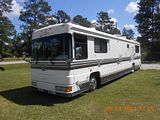 |
My advice. Leave for Florida NOW!!!!!!!!!!!!!! Nick | |||
|
 6/12 6/12Formally known as "Humbojb"  |
Now that Cagle guy has the right thinking
| ||||||||||||
|
This brings back long forgotten memories. If you have not filled you fuel tank, add anti-gel and top it off. I usually used tank heaters. Lots cheaper and just as good. Would also blow alcohol thru the air lines. This was in the GM4106 bus. Most of my winter driving was back then. Now the Barth does not see freezing temps. '92 Barth Breakaway - 30' 5.9 Cummins (6B) 300+ HP 2000 Allison Front entrance | ||||
|
 4/08 4/08"5+ Years of Active Membership" |
This is our first foray south for a lengthy stay. Leaving in January probably wasn't the best choice but the die is cast at this point. I'm going to make preparation as best I can and we'll see how it goes. It'll be Florida this year and maybe Arizona or New Mexico next year.we're still trying to figure out where we want to end up for the winters. Bill & Georgene Goodwin 92 (Feb.) Regency 36ft 300hp Cummins Gillig Chassis (1990 build date) 2014 Honda CRV toad 10Kw Power Tech Gen w/ Kubota diesel engine Can accomodate Barth visitor with advance notice  | |||
|
Official Barth Junkie |
Welcome to my world. I have gone to Florida from Michigan in February the last 5 winters. The gas engine is not as fussy about temps and will start at 10 degrees, as it did a couple of times. No real mechanical problems. Between shoveling the roof, no water, packing in the cold and driving on snowy roads I do not recommend it. Especially the latter, with the mountains of salt all over the roads. I have seen more undercarriage corrosion in the last 5 years than the previous 25 years. 9708-M0037-37MM-01 "98" Monarch 37 Spartan MM, 6 spd Allison Cummins 8.3 325+ hp | |||
|
| Powered by Social Strata |
| Please Wait. Your request is being processed... |
|
This website is dedicated to the Barth Custom Coach, their owners and those who admire this American made, quality crafted, motor coach.
We are committed to the history, preservation and restoration of the Barth Custom Coach.
We are committed to the history, preservation and restoration of the Barth Custom Coach.

